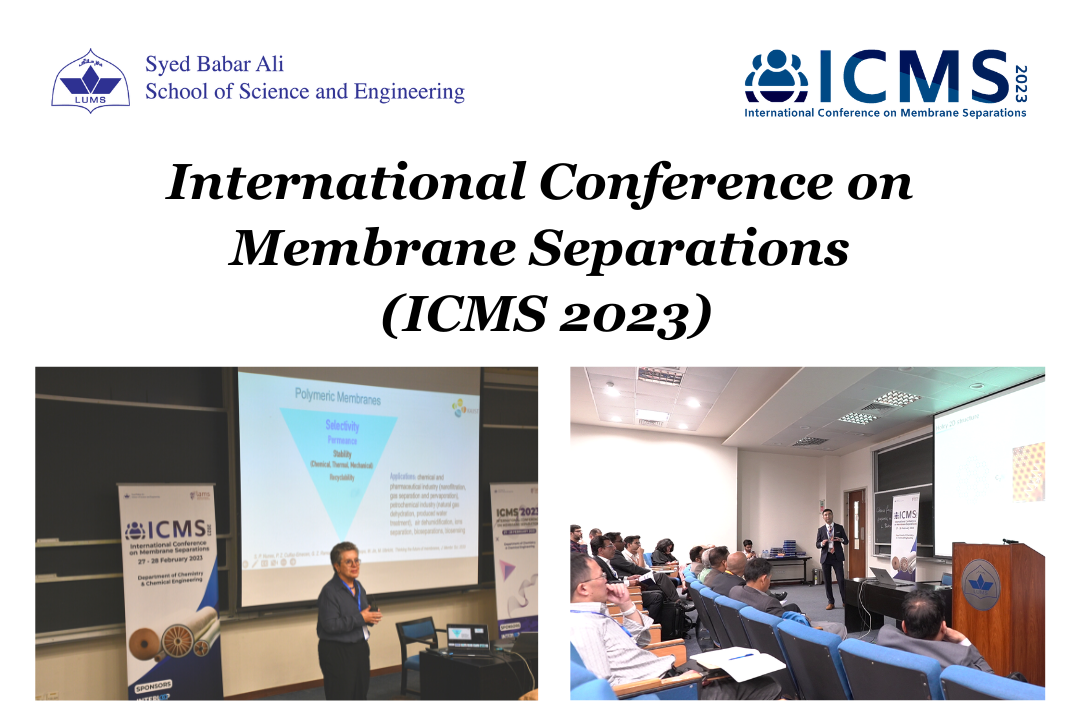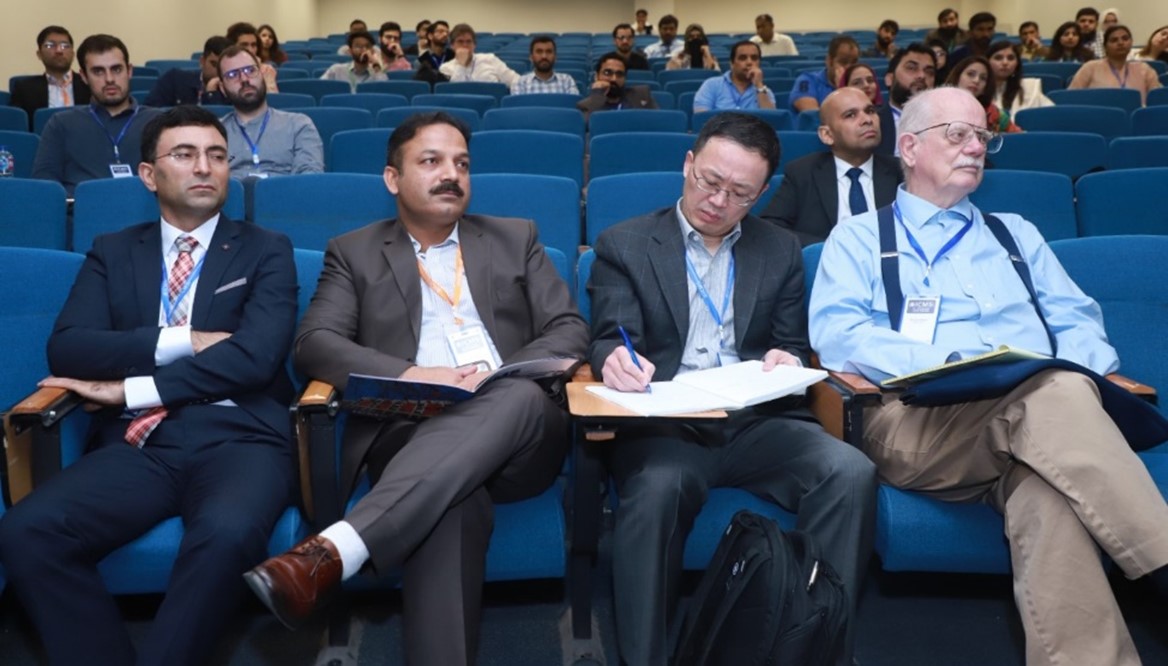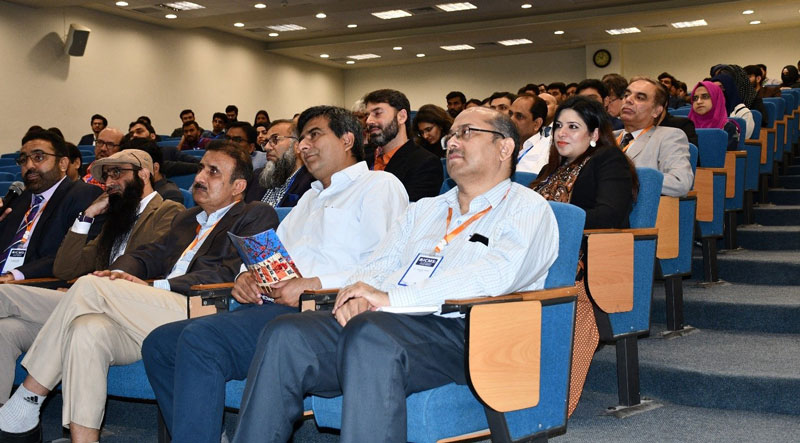
International Conference on Membrane Separations (ICMS 2023)
“I did not know that Pakistan has one of the largest textile industries in the world.” This was the response of two of the most prominent personalities in the field of membrane sciences, Dr Richard Baker and Prof. Haiqing Lin, after attending the first International Conference on Membrane Separations (ICMS) on February 27th and 28th, 2023.
Organized by the Department of Chemistry and Chemical Engineering and the Laboratory of Advanced Membranes and Separations at LUMS, this one-of-its-kind conference in Pakistan brought leading membrane researchers in academia and practitioners from across Pakistan to exchange ideas with global membrane experts. The first ICMS also saw significant participation from students representing 21 universities from across Pakistan and Europe.
The textile industry is one of the country’s most important industries alongside the oil and gas industry, pharmaceuticals, water treatment, chemical and metal processing industries, which employ membrane technology. A membrane acts as a filter separating different substances by allowing some substances to pass through while blocking others. The technique is often used in the process of separating and purifying materials. For instance, Mr Fauz-ul-Azeem from Interloop, one of the leading textile manufacturers in Pakistan, spoke about the use of membrane technology for reusing resources, especially textile dyes. While Prof. Haiqing Lin from the State University of New York at Buffalo discussed the ongoing research on efficiently purifying dye solutions used in textile dyeing.

“While academia provides ground-breaking research, the industries are the true driving force in the field of membrane technology,” the principal organiser of the conference, Dr Faheem Akhtar, shared his idea behind gathering people from academia and the industry from around the world under one roof. The conference covered all technical areas of membrane science and separations but focused on their application in carbon capture, water treatment, gas separation and solvent separation. Dr Faheem chose these areas based on the needs of the local enterprise. Other than Interloop, delegations from Mari Petroleum Company Limited, Descon Oxychem Limited, Packages Limited and Bulleh Shah Packaging were enthusiastic participants in the ICMS. Several internationally acclaimed researchers within the four domains of membrane applications, namely, carbon capture, water treatment, gas separation and solvent separation, were invited.
Dr Richard William Baker, the founder of Membrane Technology and Research, Inc. (MTR), one of the leading companies in membrane research, development, engineering, and production of membranes for carbon capture, was among the distinguished international guests. Dr Richards’s ground-breaking contributions to the field of membrane technology for more than 60 years make him one of the most prominent personalities in the domain. Having worked with Dr Faheem before, he immediately accepted the invitation to the first ICMS. Prof. Klaus-Viktor Peinemann, the first employee in MTR paid rich tribute to Dr Baker during his opening remarks. Prof. Peinemann later founded GMT Membrantechnik in Germany and became recognized as a leader in developing and manufacturing innovative membranes and modules. His research centers around developing unique membrane morphologies for pressing separations.

Prof. Suzana Nunes pictures while sharing her insights with the audience. She is also the Vice Provost for Faculty and Academic Affairs at KAUST.
Due to prior engagements, Prof. Suzana P. Nunes, the Professor of Chemical and Environmental Science and Engineering at King Abdullah University of Science and Technology (KAUST), only joined the conference for one day. Her lecture discussed the recent discovery of her team on membranes for the selective separation of hydrocarbons and crude oil mixtures that could eclipse current industrial thermal processes. Prof. Cafer Yavuz, also from KAUST, shared strategies for effective carbon capture in his scintillating talk. Another prominent European researcher, Prof. Ivo Vankelecom from Katholieke Universiteit Leuven (KU Leuven), spoke about solvent-resistant membranes and discussed some of their recent discoveries published in the journal Science. With five plenary speakers and sixteen keynote speakers, the two-day conference became a synergy of ideas spanning both theoretical and practical applications of membrane technology.
Prof. Klaus-Viktor immensely enjoyed the mix of speakers, but he was genuinely fascinated by interacting with an engaging audience. “What impressed me was the number of questions from the audience and the lively discussion that took place. This is quite unusual. Most conferences I have attended only have a few or no questions from the auditorium,” remarked Prof. Klaus-Viktor.
Students actively participated in the conference discussions and showcased their research through poster presentations. Fifty students from within and outside Pakistan presented their posters. Muhammad Hafi Wadgama from LUMS, Victor Manuel, PhD candidate from the University of Cantabria in Spain and Ayesha Bilal from COMSATS Lahore won the first, second and third prize respectively.

One of the main thrusts of the ICMS was bridging the industry-academia gap in a post-Covid-19 world. It was noted that many new industries evolved during COVID-19 such as the influx of membrane-based face masks and the use of membranes for separating nitrogen and oxygen gases in oxygen cylinders. For instance, Dr Zeeshan Khatri from the Department of Textile Engineering at Mehran University of Engineering and Technology shared how he and his team made their membrane-based masks during the pandemic. In his talk “Nanofibers Membranes: Mass Production and Commercial Uses”, Dr Zeeshan also shared the use of nanofibers in making tents for flood victims in the province of Sindh. This was only one of the sixteen keynote lectures during the two days. Dr Faheem, however, made sure to get a laugh out of the audience every now and then, either with a witty joke or a provoking question in between the lectures.

A day before the conference, the international visitors also explored historical sites around Lahore, like the Walled City and Badshahi Mosque. The pleasant spring weather enhanced the enjoyment of riding on the traditional Rangeela Rickshaw around Lahore. The excursion ended with dinner at the famous Haveli Restaurant overlooking Badshahi Mosque.

“Why would anyone come to Pakistan to discuss membrane technology?” Dr Faheem recalls wondering while planning the first ICMS. A sterling line-up of speakers, both plenary and keynote, the participation of enthusiastic students and representation of some of the largest industries across Pakistan made this conference an excellent platform for learning and networking. As Dr Richard Baker put it so beautifully, “This is a great opportunity to interact with people from this side of the world, both Pakistan and other countries like Japan and Saudi Arabia, because membrane technology is, after all, focused around the US and Europe.” While sharing his fascination over Pakistan having one of the world's largest membrane gas separation plants, Dr Richard posited “Pakistan is in a sense a leader in membrane applications”. Other international speakers shared the same enthusiasm about Pakistan. Though it was Prof. Klaus-Viktor Peinemann’s first visit to Pakistan, it will certainly not be his last. The German scientist is already looking forward to returning to explore the potential of collaborations in the country.
After the successful execution of the first ICMS by Dr Faheem and his team, with attendees already eager to know when the next conference would take place, it is safe to say, “Why won’t anyone want to come to Pakistan to attend the International Conference on Membrane Separations?”

